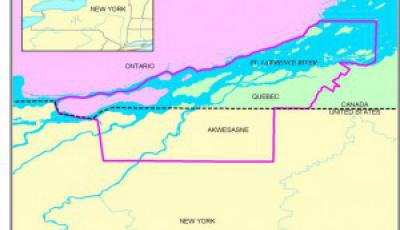From the Field is Border Criminologies’ ‘mini-post’ series featuring news from researchers currently in the field. In this instalment, Border Criminologies Advisory Group member Anna Pratt, Associate Professor of Criminology, York University, discusses her current research project in Canada.
I'm presently engaged in a study of the Canada-U.S. Shiprider program, formalized in June 2013. According to the Royal Canadian Mounted Police (RCMP), this border security arrangement “removes the international maritime boundary as a barrier to law enforcement” by authorizing Canadian and American law enforcement officers to enforce the law on both sides of the international maritime boundary. I'm examining the origins of this program, its rationales and objectives, its socio-spatial dimensions, the law and policy regimes that govern it, and the specific technologies that it deploys. I will consider these in relation to the broader themes of border control and the reconfiguration of sovereignties, scale and jurisdiction, and the production of national identities. These themes take on particular salience in light of the connections between the Shiprider program and the Mohawk Akwesasne territory near Cornwall, Ontario, where this initiative was first launched as a pilot project.
The Shiprider program is particularly significant because it effectively reconfigures national sovereignty through practices that artfully recraft and redeploy the mechanism of jurisdiction and reimagine the border construct as if they share the fluidity of the maritime waters being policed. This study of the Shiprider program will therefore not only shed specific empirical light on this novel, hybrid technology of border control and law enforcement, but it also promises to unsettle the very self-evidence of ‘the border’ itself. This study will consider the border as a governing resource that not only enables novel forms of enforcement like the Shiprider program but that also produces particular forms of sovereignty, national identity, and citizenship.

The second reason for the significance of this study has to do with the socio-spatial geography of the Shiprider program. The shiprider program claims to remove 'jurisdictional roadblocks' to law enforcement that are associated with the international border. But it's not only the national jurisdictions of the U.S. and Canada that are important. The Shiprider program was first piloted in 2007 in the St. Lawrence Seaway, in the waters that flow through the Akwesasne Mohawk Nation. The territory of the Akwesasne Mohawk Nation encompasses the provinces of Quebec and Ontario and the state of New York, extending across the St. Lawrence Seaway. Mohawks from the Akwesasne nation never conceded jurisdiction to British or French colonial states, nor to Canada or the U.S. The territory belonging to the Akwesasne Mohawk nation has been described as a state of ‘lawlessness’ and a jurisdictional ‘black hole’ that allows cross border criminal activity between Canada and the U.S. to flourish. However, in contrast to the imagery of a lawless, black hole, Akwesasne is in fact thoroughly embedded in multiple, intersecting and deeply contested socio-spatial, legal and quasi-legal regimes, jurisdictions and diverse networks of authorities. This study will provide the starting point for a larger study of the socio-spatial and legal landscape and ‘marinescape’ of the Akwesasne nation.
Any thoughts about this topic? Post a comment here or on our Facebook page. You can also tweet us. See also other From the Field mini-posts:
- From the Field: Taking Photos Inside Immigration Detention
- From the Field: Betrayed by Norway
- From the Field: Sarah Turnbull’s Current Research at Yarl’s Wood
- From the Field: How to Build a Network (of Sanctuary)
- From the Field: ‘Going to Prison’ and Accompanied Assumptions
- From the Field: Ticking-boxes at HMP Huntercombe
- From the Field: Marion Vannier’s Day in Prison
- From the Field: Ines Hasselberg’s Research among Foreign-National Prisoners
- From the Field: Sarah Turnbull’s Current Research in Immigration Detention
- From the Field: Bethan Loftus’ Research Trip to Canada
Share:








